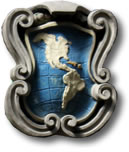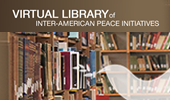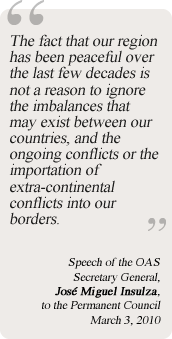| Home |

Course on Peace, Democracy and Conflict Resolution
September 22, 20109:00a.m. - 9:20a.m.Welcome and Overview of Course (Christopher Hernández-Roy, Director, Department of Democratic Sustainability and Special Missions) Introduction to the OAS Peace Fund’s first course on peace building, promotion of democracy and conflict resolution in the Americas: the three constant themes of the inter-American system and the purpose for which the community of hemispheric nations created what is today known as the Organization of American States. 9:20a.m. – 10:10a.m. The Inter-American System, the OAS and its Predecessor Agencies (Jean-Michel Arrighi, OAS Secretary for Legal Affairs) The OAS, the international organization of the countries of the Western Hemisphere, is the result of a continuous, evolutionary process of inter-American cooperative action that started more than 100 years ago. This presentation will provide an overview of the origins and development of an ongoing spirit to strengthen regional unity and defend the common interests of peace, justice and prosperity, embodied in an association of states, which has evolved and adapted over time to meet the demands of the historical realities. Presentation Followed by Question and Answer Session 10:10a.m. - 11:00a.m. The Organs of the OAS: General Assembly, Permanent Council, General Secretariat (Sherry Tross, Chief of Staff of the Assistant Secretary General) The long and gradual development of inter-American relations and cooperation which led to the creation of the OAS produced the methods by which the Organization should function and through which the “confidence, friendship and goodwill” of its member states should be channeled in concrete ways. Pursuant to Article 53 of the Organization’s Charter, the OAS accomplishes its purposes by means of: the General Assembly; the Meeting of Consultation of the Ministers of Foreign Affairs; the Permanent Council and its Committees; the Inter-American Council for Integral Development; the Inter-American Juridical Committee; the Inter-American Commission on Human Rights; the General Secretariat; the Specialized Conferences; and the Specialized Organizations. This part of the program will look at the structure of the Organization and focus on the work and responsibilities of each of its organs. Presentation Followed by Question and Answer Session 11:00a.m. - 12:00p.m. Peace Instruments (José Luís Ramírez, OAS Secretariat of External Relations) Strengthening peace and security, preventing conflicts, and resolving disputes are among the essential purposes of the OAS, as established in its founding Charter. The constant regional aspiration to live in peace and harmony has led to the adoption of a number of peace-based tools which provide the member states with a range of conflict resolution mechanisms, such as direct negotiation, good offices, mediation, investigation and conciliation, confidence-building measures, judicial settlement, and arbitration. This section will examine in-depth some of the most important peace instruments which the member States can turn to in case of intrastate or interstate conflicts, such as: the OAS Charter; the Pact of Bogota; the Inter-American Democratic Charter; and the Peace Fund, among others. Download presentation Followed by Question and Answer Session 12:00p.m. - 2:00p.m. Lunch Break 2:00p.m. - 2:40p.m. Multidimensional Security (Abraham Stein, Deputy Secretary for Multidimensional Security of the OAS) Since its inception, the OAS has used inter-governmental cooperation to prevent conflicts and promote peace in the region. The concept of security, once framed largely in conventional military terms, today takes into account a range of other evolving threats such as international terrorism, illegal arms dealing, trafficking in persons, institutional corruption, and organized crime. Moreover, in some countries, poverty, disease, environmental degradation and scarcity of natural resources increase vulnerability and help undermine human security. At the Special Conference on Security in October 2003, the Member States adopted the Declaration on Security in the Americas and stated that peace is a value and a principle in itself, based on democracy, justice, respect for human rights, solidarity, security, and respect for international law. Experts from the Secretariat of Multidimensional Security will discuss how the concept of security in the Americas has evolved and how the OAS is responding to the new security challenges of the 21st Century. Download presentation Followed by Question and Answer Session 2:40p.m. - 3:20p.m. Demining Issues in the Americas (Carl Case) Download presentation: Part 1; Part 2. 3:20p.m. - 4:00p.m. The Inter-American Defense Board and Confidence-Building Measures (Brigadier General Ancil W. Antoine, Director General, Inter-American Defense Board) In an effort at strengthening civilian-military relations in the region, in March, 2006, the Inter-American Defense Board officially became an entity of the OAS. The central role of the Board is to provide advice to the OAS on military and defense matters, help strengthen democratic governance, and create an atmosphere of peace, progress, and respect for human rights throughout the Americas. Officials of the Board will address this relationship with the OAS and discuss how both entities jointly advance the consolidation of peace and security in the Americas. Followed by Question and Answer Session 4:00p.m. - 4:50p.m. Inter-American Human Rights and International Humanitarian Law (Santiago Cantón, Executive Secretary of the Inter-American Commission on Human Rights of the OAS) What are the duties of the States to protect citizens from human rights abuses? Does law offer protection in armed conflicts in their various forms – both international and internal? What are crimes against humanity? What protection exists in civil wars? The Western Hemisphere boasts one of the most respected systems to confront human rights abuses: the Inter-American Commission on Human Rights and the Inter-American Court on Human Rights. These two instruments are charged with promoting justice and providing recourse to people in the Americas who may have suffered violations of their human rights. During this presentation, participants will be given an overview of inter-American human rights law and international humanitarian law and the convergence between both. Presentation Followed by Question and Answer Session 4:50p.m. - 5:30p.m. Women, Peace and Security (Hilary Anderson, Inter-American Women Commission) Throughout the world, the full and equal participation of women in all aspects of peace and security is fundamental for democracy-building, good governance and the construction of more stable and secure societies where conflict is less likely to develop. In general, in countries suffering armed violence, women are present in all aspects of conflict as victims, combatants, heads of family and leaders of their communities, yet their voices are rarely heard at the peace tables and their priorities continue to be largely marginalized. The Inter-American Commission of Women (CIM) has received several specific mandates on the issue of women, peace and security. Its Strategic Plan of Action, approved in 1994, establishes the need ‘to expand efforts to find solutions and reduce conflicts through dialogue and political negotiations.’ Resolution CIM/RES 227, adopted by the 2002 Assembly of Delegates, mandated the CIM Permanent Secretariat ‘to continue working in partnerships with civil society organizations to… support and promote the implementation of UN Security Council Resolution 1325 in the Hemisphere and the full participation of women in conflict prevention and peace-building.’ This part of the course will focus on how, within the OAS, the issue of gender in conflict resolution and reconstruction is being addressed by the CIM, the principal forum for promoting women’s human rights and gender equality and equity in the Hemisphere. Download presentation Followed by Question and Answer Session 5:30p.m. Close September 23, 2010OAS PEACE MISSIONS: CASE STUDIESThe OAS has vast experience and expertise in conflict resolution and peace efforts. Since its inception, the Organization has been continuously called upon by its member states in times of crisis and has deployed dozens of peace missions of a different nature, ranging from short-term ad hoc and good offices assignments to longer term demobilization, disarmament and peace building missions. This part of the program will offer unique insights into the challenges and results of specific OAS Civilian Peacekeeping Missions such as in Nicaragua (CIAV), Haiti, Suriname, Colombia (MAPP), Belize and Guatemala, as well as of the most recent special political and good offices missions in Colombia and Ecuador, Bolivia and Honduras, among others. 9:00 a.m. - 9:40 a.m. Civilian Peacekeeping in Nicaragua (Roberto Menéndez, International Commission of Support and Verification in Nicaragua (CIAV/ OAS) Download presentation Followed by Question and Answer Session 9:40a.m. - 10:20a.m. Civilian Peacekeeping in Haiti (Colin Granderson, Assistant Secretary General for Foreign and Community Relations of the Caribbean Community) Followed by Question and Answer Session 10:20a.m. - 11:00a.m. Civilian Peacekeeping in Suriname (Christopher Healy, Former Resident Coordinator of OAS Special Mission in Suriname) Download presentation Followed by Question and Answer Session 11:00a.m. - 11:40a.m. Civilian Peacekeeping in Colombia (Marcelo Álvarez, Chief of OAS’s Mission to Support the Peace Process in Colombia) Presentation Followed by Question and Answer Session 11:40a.m. - 12:20p.m. Civilian Peacekeeping in Belize and Guatemala (Raúl Lago, Special Representative of the OAS Secretary General for Belize and Guatemala) Presentation 12:20p.m. - 2:00p.m. Lunch Break Special Guest Lunch Speaker: Ambassador Dr. Didier Opertti Badán 2:00p.m. - 2:40p.m. Ad-hoc and Good Offices: Bolivia, Ecuador, Haiti and Nicaragua (Raúl Alconada Sempé, Former Director of the Department of Sustainable Democracy and Special Missions, OAS) Followed by Question and Answer Session 2:40p.m. - 3:20p.m. Recent Missions - Colombia-Ecuador (MIB) - Honduras Victor Rico, OAS Secretary for Political Affairs Jean-Michel Arrighi, OAS Secretary for Legal Affairs Presentation Followed by Question and Answer Session 3:20p.m. - 4:00p.m. Electoral Observation Missions Since the end of the Cold War and with the fall of most authoritarian regimes in the Western Hemisphere, the international community has increasingly become more involved in monitoring or administering various aspects of transition towards peace within states. The creation of the OAS Electoral Observation Missions was one step in that direction taken by the leaders of the Hemisphere. These Missions are essential tools to promote and defend democracy in the region. Their main purpose is to contribute to the guaranteeing of free and fair elections, and to strengthen the credibility of democratic institutions. Genuine democratic elections serve to resolve peacefully the competition for political power within a country and thus are central to the maintenance of peace and stability. This presentation will describe how the missions work and the methodologies used to evaluate the electoral processes, as well as how the OAS contributes to institutional strengthening by providing technical cooperation to the Member States in between elections. 4:00p.m. - 4:40p.m. Effective Public Management (Robert Devlin, OAS Director of the Department for Effective Public Management) Sustainable democracy requires that governments deliver the fruits of development to their people. The presentation will explain how the OAS addresses the challenge of supporting public sector management for achievement of national development objectives and how the public sectors of the region can better use public-private alliances to guide the formulation of strategic medium –long term development strategies. The presentation will examine how a number of very successful extra-regional countries have used these alliances to their advantage for development policy formulation and then review the state of the incipient alliances in Latin America and the Caribbean countries along with the areas where OAS support can help improve their effectiveness. Download presentation Followed by Question and Answer Session 4:40p.m. - 5:20p.m. Development, Reconciliation and Peacebuilding (Alfonso Quiñónez, OAS Secretary for External Relations) Peace and conflict resolution efforts must address economic and social development issues. Poverty, inequalities, and natural disasters are all elements that contribute to creating vulnerable environments where conflict situations can take root. Thus conflict, peace and development are profoundly interconnected. Likewise, reconciliation through economic development has proven successful in many post-conflict situations. The OAS has dual roles in promoting development. On a political level, it fosters dialogue and consensus on ways to combat poverty and improve the level of development in the region. The OAS also mobilizes funds, through the Executive Secretariat for Integral Development, so member states can carry out projects in priority areas, such as sustainable development, trade and competitiveness, tourism; education, culture, science and technology; and social development and employment. This course will conclude by reviewing the work of the OAS in the area of development in order to promote sustainable and peaceful societies. Download Presentation: Part 1; Part 2. Followed by Question and Answer Session 5:20p.m. - 5:30p.m. Closing |





